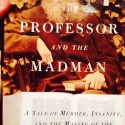-
Unnaturalness in experimental design
I read a language related article today where the researchers presented their subjects sentences with the words making up the sentences being presented serially on a screen. Their goal was to determine if brain responses correlated with the presentation of words in a sentence carrying more information according to several probabilistic models of language. The material that they presented…
-
In which Morrissey responds to Kris’ question on the utility of linguistics
Kris asks: what is linguistics good for? Here’s what Morrissey has to say: I’m not quite as pessimistic as Morrissey. I Kris’ question has layers to it. I believe those who engage in exegesis (a group to which I no longer belong) benefit from using resources informed by modern linguistic theory. I believe they would benefit from…
-
Is Cognitive Linguistics growing “dominant”?
Short answer: I don’t think so. Or at least, I’m not sure. For the backstory and my reasoning for saying so read on. Today I read a review of Constantine Campbell’s Advances in the Studies of Greek by Nicholas Ellis and Mike Aubrey over at Themelios. Lest I give any of those who know me any misconceptions, I didn’t do…
-
Kris Lyle on qadosh in TDOT
-
Searching Semantic Roles is Awesome in Logos 6 #Logos6
Last week I wrote a post about exploring meaning using case frames in Logos 6. I plan to come back to that topic with more practical examples in the near future, but I also wanted to introduce you to the semantic roles data on its own terms by taking a look at how these roles…
-
Explore Meaning with Case-frames in Logos 6 (Or, what I’ve worked on for the last year) #Logos6
Rick has already posted some of his favorite features in Logos 6. So, I thought I’d take some time to post on my favorite feature in Logos 6 while also mimicking his post title. Incidentally, I’m biased because I worked on the Hebrew data for this project. Paul Danove (whose work really inspired this feature)…
-
McWhorter’s The Story of Human Language on Sale
-
Must a person speak a language to understand it?
This is an important question to ask for instructors of ancient languages who want to move toward communicative approaches to language instruction, and the answer to this question is: no. This doesn’t necessarily rule out that we should use communication in ancient language instruction (though for this and a number of other reasons I wouldn’t),…
-
Reading a second language will never be like reading a first language
This post is in partial reply to one written by Daniel Streett. I should start off by saying that I applaud the efforts of all those attempting to make biblical language instruction better and to train better interpreters of the bible. Changes in biblical language instruction still have a long way to go and have…
-
With lexicographers you really just never can tell
